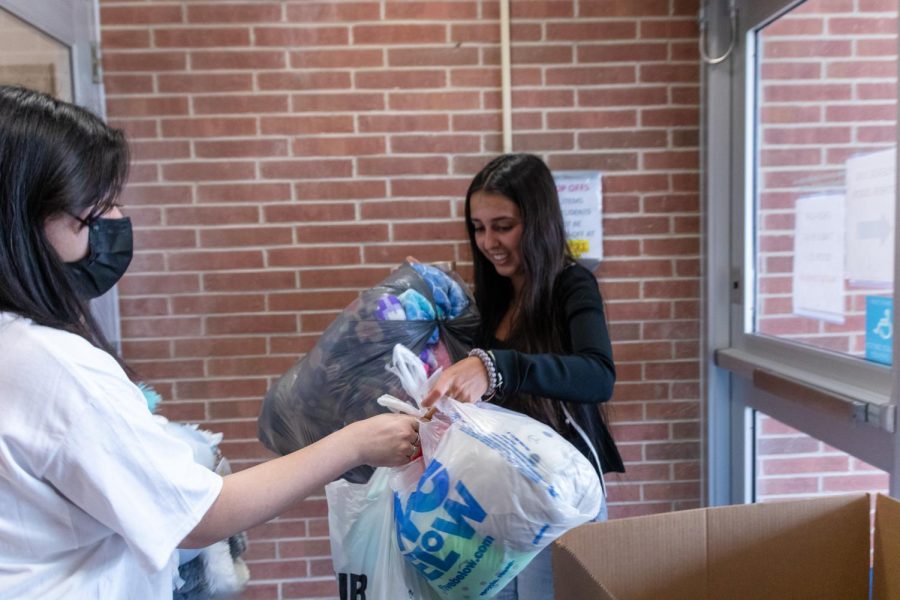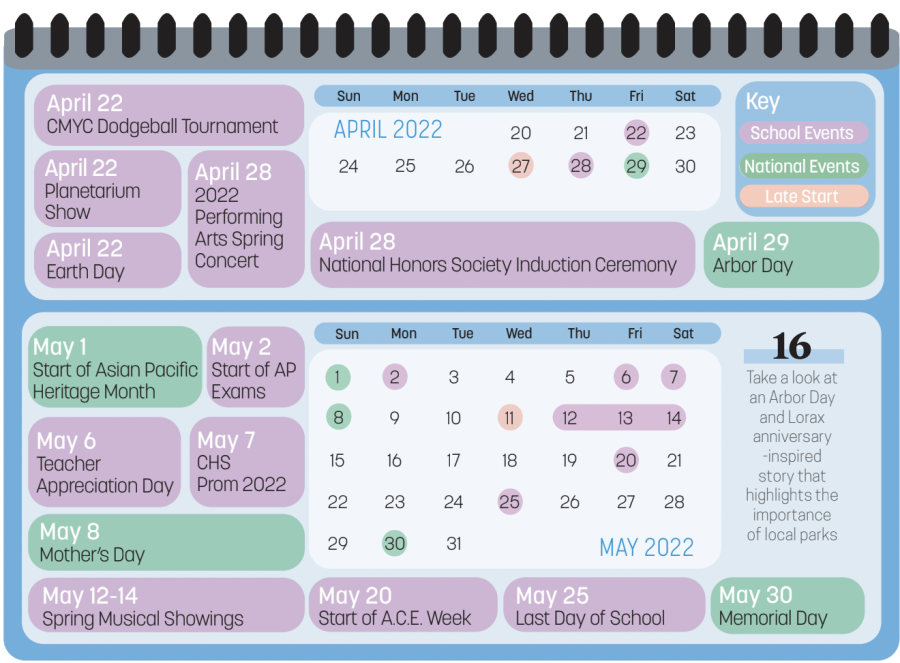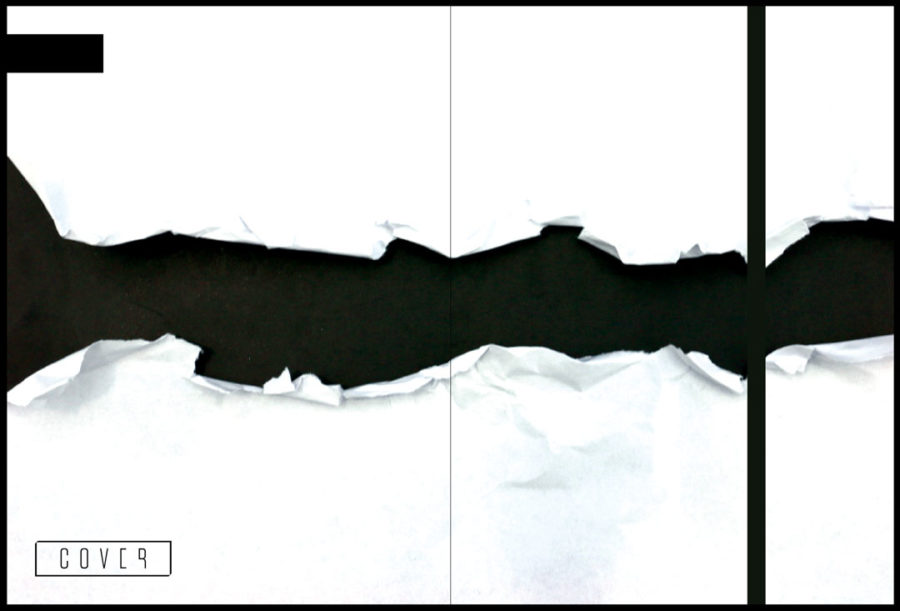When Mariam Aziz, Muslim Student Alliance member and senior, pulled up her news feed on Facebook, a picture of a crying girl receiving a certificate from men in black robes caught her eye. The caption read, “Gazan girl accepts her mother’s diploma during a graduation ceremony after Israel murdered her mother.” The picture earned 77,600 “likes,” received 1,443 comments and was shared 9,961 times in one night. It was one of news media’s million articles portraying conflicts such as the one between Israel and Palestine, uploaded by Gazan speaker and activist Mohammed Zeyara.
“I saw that picture, and I got a little teary. I thought, ‘Wow, I can’t believe that girl has to go through this,’” Aziz said.
But Aziz only got one side of the story: the girl’s side.

Aziz said although she empathizes with the girl in the picture, she can’t make a judgment call because she doesn’t know the Israelis’ side of the story. For Aziz, like many others, the desire to get the full picture defines how she navigates today’s news. According to a February 2013 Princeton University study, news media is becoming increasingly polarized, affecting the attitudes of its viewers.
Media specialist Theresa Ramos said she attributes the polarization in news to the nature of media.
“All news outlets have some sort of bias. They’re coming from a particular set of beliefs or philosophies, no matter how hard they say that they’re going to try to be impartial,” she said. “Certain news channels and certain news magazines portray things in their own ways.”
“In a way, a lot of Western media attacks Islam. Obviously, it’s not all Western media, but many people associate Islam with terrorism, not with radicals, which is what they are,” Aziz said. “Even if I hear that kind of thing on the news, I don’t believe it. The media, though, they try to convince people, to manipulate them that this is how it is. It’s sad, but it’s the truth.”
Ramos said people often don’t realize what the media is saying may not be completely the truth.
“We are an immediate society. The goal for all of these news sources is to be the first one to get that news out; they want to be the ones to break that story,” she said. “That’s where errors come into play. I think news sources are careful, but sometimes not so much. If you’re a big news organization, you can make up a post about a situation. The thing is, everybody will assume it’s true and even more news sources will put the same content out there for consumers.”
According to Brian Spilbeler, communications teacher and media literacy specialist, news outlets have become biased due to the profits they make off selling entertainment to their audiences.
“In the past, news networks didn’t worry about making money off of news. News could just be fair, valid and informative. It didn’t have the added obligation to entertain,” he said.
Spilbeler said that once news consumption shifted towards cable networks such as CNN, news outlets realized they could target specific audiences with their own brands of news.
“This allows news outlets to make money, because that target audience could be advertised to,” he said.
Online media is currently the most common way for people to consume news. For Aziz, the internet is her primary news source. According to a 2013 Pew Research survey, 30 percent of adults in the United States get their news from social networking sites such as Facebook, Twitter and Reddit. However, people “like” and comment on news stories just as frequently as they click on links.
Ramos said, “News media is moving more towards being online. Most people now rely on their cell phones or whatever device they have on their person more than a hard copy of something that’s in print.”
 Aziz said consumers of news lose out when they get information from only one source because there is no other source to compare it to to see if the information from both sources line up and make sense. Even though the trend is for people that access news online, according to the survey, 21 percent of people who use Facebook also read printed newspaper, 65 percent watch TV and 25 percent listen to the radio.
Aziz said consumers of news lose out when they get information from only one source because there is no other source to compare it to to see if the information from both sources line up and make sense. Even though the trend is for people that access news online, according to the survey, 21 percent of people who use Facebook also read printed newspaper, 65 percent watch TV and 25 percent listen to the radio.
“I don’t really read newspapers, but I think I should because you can get a second perspective about an issue from just reading the paper. I get most of my news online because it’s a lot easier just to log onto Facebook or some other social media site and click on the different news channels,” Aziz said. “It’s even easier if you follow the channel on social media. Then it just shows up on your feed or by a page share.”
Aziz said she follows CNN, Fox News, National Geographic and ABC. “I see their posts on social media, but if I see something that’s really interesting, I’ll go to the actual news website to find something more in-depth,” she said.
Spilbeler said that people see big-name news organizations like CNN and Fox News much more than smaller ones because of the greater number of resources they have access to. Some news sites show higher levels of engagement from visitors than other, less popular ones.
“The reason you hear about CNN and Fox is because they’re bigger, they’re more powerful, they have more views and listeners, and they have the most resources, that is, money,” Spilbeler said.
According to Spilbeler, stories featured on well-known news outlets’ websites aren’t necessarily the most newsworthy.
“You only see the information as a big, prominent story, but is the information in it really the most important information you need to know? Most of the time, it isn’t. News outlets put them up because they know these stories will engage you. They’ll make you want to click on them, and that is what makes money,” he said.

 Ramos said opinions online and in the media have effects on a person-by-person basis.
Ramos said opinions online and in the media have effects on a person-by-person basis.
“Sometimes, people have the idea that high school students don’t concern themselves with recent conflicts and events. I think that teenagers actually do have concerns about these kinds of things, though,” she said. “People want to live in a nice world, a safe world. Whatever’s going on in this world does affect them. In your thought process, you’re going to be affected by your friends, your family and what you hear or read in a news report. Your feelings on an issue will be a combination of all these different things.”
According to Aziz, her parents don’t try to influence her opinions.
“My family doesn’t really force anything on to me. I guess the best way to put it is: I have a brain, and I can think for myself,” she said. “People shouldn’t tell you, ‘This is what you have to believe. This is what’s right. Listen to this because you have to follow this way.’ I’m responsible for my own self and my own actions. I am capable of deciding what’s right and what’s wrong.”
Ramos said she sees relatives’ influence on students as a case-by-case basis.
“Obviously, relatives have a big part in how young people think. Family is who they’re around for a big chunk of their time. Then again, though, there are just as many young people who will go against what adults are saying to them,” she said.
Aziz uses her family to get both sides of the conflicts concerning the ISIS militant group’s terrorism. She said she always tries to listen to both sides of a story so she knows exactly what’s going on.
“I tend to trust the things people say more when they’re people who have family or they themselves are going through an experience,” she said.

“Most of the Muslims I know are from Iraq,” Aziz said. “They actually have connections and family who are going through this. They know what’s going on. This is one source of how I know what’s going on over there in the Middle East. It’s really great, because then I can compare it to what the media is saying here in the West. Let’s compare what the media is saying on both sides, and only then I can see which makes more sense to me. That’s when the bias in media becomes really apparent.”
Polarization in social media becomes especially apparent in long-standing conflicts such as the racial conflict associated with Ferguson, in which an unarmed African-American teenager was shot by a white police officer. An August 2014 survey by Pew Research found that 44 percent of people think the Ferguson case should raise racial issues that require discussion to be solved. Forty percent, however, said racial issues are overblown and receive more attention than deserved.
Ramos said, “I’m just blown away that race is still a problem. You can look back in history and you can see the civil rights movement from 50 years ago, but today we still have these kinds of issues with race. I don’t think you can hear or see this kind of situation and not have some sort of opinion about it.”
Aziz said she also feels that the media’s reports of Ferguson provoke a response in news consumers.
“It’s obvious that some people are against debating this issue of race and that some people are for it. It’s obvious, but indirect. Events like Ferguson are very sensitive because people always connect them to racial problems. We always see that some race is the minority; they’re always oppressed,” she said.
Spilbeler said that topics like Ferguson become popular for news media because news outlets cater to what their audiences want to see.
“The question becomes, ‘Do you give the viewers or listeners what they want to know, or what they need to know? Many times, it’s what we want to know,” he said. “News organizations have studied consumers as a demographic, so the news agenda is set on what will get the most views or the most clicks, interactions, or feedback than a news agenda that is based on what is the most important thing the audience needs to know about. It’s our culture.”
According to Aziz, her friends and peers don’t try to influence her opinions about current events.
“My friends don’t try to get me to think positively about an issue or negatively about it. We can have discussions about current conflicts, but they’re not so in-depth that they can sway me one way or another,” she said. “My friends have a lot of respect for my beliefs and perspectives. In return, I respect their opinions. How you see something is how you view it. No one else can see something for you.”
Ramos said not knowing the entire story creates discrepancies.“Lots of people don’t know what they’re talking about when it comes to news, but that’s just human error. Maybe they’re confused. Maybe they have read about something and gotten it mixed up with something else,” she said.
“For all people,” she said, “no matter if you’re a student or an adult, your best bet is to try to be as informed as possible and make sure that you’re getting your news from accurate and credible sources like NPR (National Public Radio), CNN (Cable News Network) or BBC (British Broadcasting Corporation). In general, it’s probably just good policy to be careful with what you make strong comments about, especially if you are not fully knowledgeable about a topic. With some issues we’re seeing today, they’re such big issues that have many facets. To take a strong stance on any one of them is extremely difficult.”
Spilbeler said no matter how much credibility a source has, almost all news is biased.
“I don’t think that all news organizations are biased,” he said. “However, it’d be nice to think that these organizations are there to benefit us and to help us, as consumers. But, the stories they decide are news, are news because they know we’ll be interested in them. That’s where the bias comes in: all these news organizations are targeting specific interests of specific audiences.”
Ultimately, Aziz said she feels that people should be wary when consuming news.
“News media can be very dangerous. It could be very biased. It could be very critical. It could be not true and give you false information. You have to look behind the scenes, though. Ask yourself, ‘Where did this come from? What is the source? Is it credible?’ You have to understand what’s going on before you actually believe in something,” she said.
“You actually have to understand the truth behind a matter before you share it with other people, whether it’s news or any other kind of information. No matter what it is, you have to be sure of something’s accuracy before you spread it around.”



















![Joseph Broman, Mu Alpha Theta sponsor, grades tests for his honors precalculus/trigonometry class. Broman said, “I’m retiring from the Math Club next year and I’m just going to do Mu Alpha Theta so I can focus on that one and we can do more [speaker series] first semester.”](https://hilite.org/wp-content/uploads/2024/03/IMG_9502-1200x900.jpg)











![British royalty are American celebrities [opinion]](https://hilite.org/wp-content/uploads/2024/03/Screenshot-2024-03-24-1.44.57-PM.png)




















![Review: “The Iron Claw” cannot get enough praise [MUSE]](https://hilite.org/wp-content/uploads/2024/04/unnamed.png)
![Review: “The Bear” sets an unbelievably high bar for future comedy shows [MUSE]](https://hilite.org/wp-content/uploads/2024/03/unnamed.png)
![Review: “Mysterious Lotus Casebook” is an amazing historical Chinese drama [MUSE]](https://hilite.org/wp-content/uploads/2024/03/0.webp)
![Thea Bendaly on her Instagram-run crochet shop [Biz Buzz]](https://hilite.org/wp-content/uploads/2024/03/IMG_0165-1200x838.jpg)
![Review: Sally Rooney’s “Normal People,” is the best book to read when you are in a time of change [MUSE]](https://hilite.org/wp-content/uploads/2024/03/20047217-low_res-normal-people.webp)
![Review in Print: Maripaz Villar brings a delightfully unique style to the world of WEBTOON [MUSE]](https://hilite.org/wp-content/uploads/2023/12/maripazcover-1200x960.jpg)
![Review: “The Sword of Kaigen” is a masterpiece [MUSE]](https://hilite.org/wp-content/uploads/2023/11/Screenshot-2023-11-26-201051.png)
![Review: Gateron Oil Kings, great linear switches, okay price [MUSE]](https://hilite.org/wp-content/uploads/2023/11/Screenshot-2023-11-26-200553.png)
![Review: “A Haunting in Venice” is a significant improvement from other Agatha Christie adaptations [MUSE]](https://hilite.org/wp-content/uploads/2023/11/e7ee2938a6d422669771bce6d8088521.jpg)
![Review: A Thanksgiving story from elementary school, still just as interesting [MUSE]](https://hilite.org/wp-content/uploads/2023/11/Screenshot-2023-11-26-195514-987x1200.png)
![Review: When I Fly Towards You, cute, uplifting youth drama [MUSE]](https://hilite.org/wp-content/uploads/2023/09/When-I-Fly-Towards-You-Chinese-drama.png)
![Postcards from Muse: Hawaii Travel Diary [MUSE]](https://hilite.org/wp-content/uploads/2023/09/My-project-1-1200x1200.jpg)
![Review: Ladybug & Cat Noir: The Movie, departure from original show [MUSE]](https://hilite.org/wp-content/uploads/2023/09/Ladybug__Cat_Noir_-_The_Movie_poster.jpg)
![Review in Print: Hidden Love is the cute, uplifting drama everyone needs [MUSE]](https://hilite.org/wp-content/uploads/2023/09/hiddenlovecover-e1693597208225-1030x1200.png)
![Review in Print: Heartstopper is the heartwarming queer romance we all need [MUSE]](https://hilite.org/wp-content/uploads/2023/08/museheartstoppercover-1200x654.png)























![Review: Ladybug & Cat Noir: The Movie, departure from original show [MUSE]](https://hilite.org/wp-content/uploads/2023/09/Ladybug__Cat_Noir_-_The_Movie_poster-221x300.jpg)

![Review: Next in Fashion season two survives changes, becomes a valuable pop culture artifact [MUSE]](https://hilite.org/wp-content/uploads/2023/03/Screen-Shot-2023-03-09-at-11.05.05-AM-300x214.png)
![Review: Is The Stormlight Archive worth it? [MUSE]](https://hilite.org/wp-content/uploads/2023/10/unnamed-1-184x300.png)




